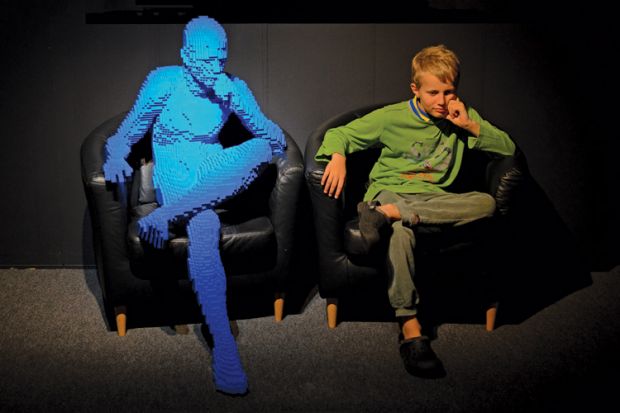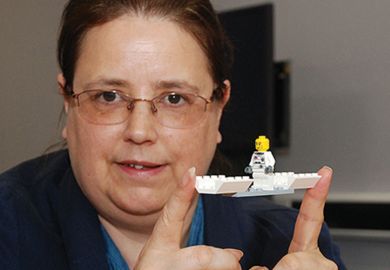Not many professorships attract applications before they have even been advertised – and especially not from a nine-year-old boy. But that is what happened when media around the world reported the news earlier this year that the University of Cambridge was going to establish a Lego professorship of play in education, development and learning – endowed in perpetuity with a £2.5 million donation from the Lego Foundation.
The professorship will not involve building classic Lego sets such as Hogwarts or the Black Knight’s Castle in a Cambridge study while wearing a mortar board – however much some might wish it were so.
An additional £1.5 million donation to Cambridge from the Lego Foundation has established the Research Centre on Play in Education, Development and Learning (PEDaL), which opened in June based in the Faculty of Education and officially launches on 22 October. Soon after that, the Lego professorship post will be advertised, with the successful candidate becoming director of the centre.
David Whitebread, senior lecturer in the psychology of education and acting director of PEDaL, described play as “a very under-researched area” despite its being “one of the big things about human beings that’s really characteristic of us”.
He said: “We can rightly claim we’re the first serious research centre in the world that is specifically focusing on the role of play in human development and learning, and the role of education in supporting that.”
The Lego Foundation was established by a donation from Lego, the Danish toy company owned by the Kristiansen family for several generations. The role of the foundation, which is non-profit and owns 25 per cent of the Lego company, focuses on “looking at the role of play in children’s learning and development”, according to Andrew Bollington, the foundation’s global head of research and learning.
He argued that many governments rightly aim to raise standards in education but often pursue a path of the “Pisa [Programme for International Student Assessment] league table game”.
Such a route might emphasise the role of memorising facts, according to Mr Bollington, but it was important for education to allow children scope for creativity. There are “too many kids sitting in class bored or not engaged”, he said, arguing that when they are instead in a “playful state of mind” they are “more creative, more open-minded”.
Dr Whitebread said that there is “strong circumstantial evidence that play is very significant in development” and that children who play at home “do better academically and also have better emotional well-being”.
But many believe that there is a “real crisis in play” because accelerating urbanisation worldwide is limiting children’s ability to find spaces to play in cities, he added, also noting concerns about scope for play in school systems.
The work of the research centre, which has four PhD students funded by the Lego Foundation and three postdocs (Marisol Basilio, Elian Fink and Audrey Kittredge), breaks down into three main strands: the questions of what is play, how it develops and how beneficial “playful learning” is in schools.
Jenny Gibson, lecturer in psychology and education, who will lead on the first strand, said: “We really need to know what it [play] is and how we can measure it, to decide whether it has any effect on educational development and learning.”
The aim, she said, is to “move away from the kind of wishful thinking model, where we think all play is great”, and to see if it is possible to “get some hard evidence that it’s actually making a difference that we could perhaps use to convince policymakers, or parents, or other people working with children”.
Studies that will be carried out, Dr Gibson continued, include an Economic and Social Research Council-funded project on children’s behaviour in playgrounds, using GPS tracking to “understand children’s social networks”.
As well as work in schools, research will involve observing children’s play in special labs at the Faculty of Education and collaboration with neuroscientists to study what happens in the brain during play.
Dr Whitebread cited other key planned projects: using the existing Millennium Cohort Study to see how children who experience different levels of play develop later in life, and creating a new longitudinal cohort study specifically focused on play and tracking children in later life.
Sara Baker, lecturer in psychology and education, who will lead on the third strand on schools, argued that whereas 100 years ago school education focused on the basics of reading and writing, education in the age of the internet also includes a focus on “how we use the information we have”, on communicating it to others and on problem-solving.
That additional level of skills “may be supported by playful approaches to learning”, Dr Baker said. “Getting rid of play at the same time as [making] those [new aspects] the priorities in an educational sense isn’t really a good strategy.”
Is Dr Whitebread confident that the research can proceed independently of Lego despite the foundation’s funding? He replied: “I quite specifically said to them: ‘Supposing we show that actually children learn absolutely nothing through play and particularly not through playing with Lego?’ They said: ‘We need to know that.’ They are genuinely interested in promoting scientific understanding in this area.”
In numbers
£2.5 million: gift from the Lego Foundation to endow professorship of play in education, development and learning
Campus news
Royal Holloway, University of London
A university has launched a campaign to tie in with the release of the film Suffragette. Royal Holloway, University of London’s interactive “Women Inspire” campaign includes a series of resources and events to celebrate the “pioneering history” of the institution, which was opened as the all-women Royal Holloway College in 1886. Several suffragettes studied there, including Emily Wilding Davison (played by Nathalie Press in the movie), who was fatally injured after she stepped out in front of the King’s horse during the Derby on 4 June 1913.
University of Bristol
An increasing proportion of children are being brought up by relatives other than their parents, according to an analysis of the 2011 census data. Academics from the University of Bristol found a 7 per cent growth in the number of children in kinship care in the decade to 2011. Black children were far more likely than white children to be living in kinship care, and more than half of such children were affected by poverty and deprivation.
University of Reading
A UK university has launched a joint academy with a Chinese university that will allow local students to study towards a British degree in their home country. The NUIST (Nanjing University of Information Science and Technology )-University of Reading Academy was officially launched last week. Students spend three years at the institution before completing their final year in Reading. So far, two joint programmes – applied chemistry and business, and economics and trade – are on offer, and permission has been granted to add four more.
Lancaster University
A research centre that aims to understand, mitigate and counter security threats has launched, with backing from UK security agencies. The Lancaster University-led Centre for Research and Evidence on Security Threats (CREST) also brings together researchers at the universities of Birmingham, Cranfield, Portsmouth and the West of England to deliver a national hub. The centre was commissioned by and will be administered by the Economic and Social Research Council (ESRC).
University of Stirling
Surprisingly high numbers of bees may act as “pollen thieves” in some environments, taking pollen from flowers but failing to act as effective pollinators. That is according to a University of Stirling study that was conducted in Mexico. It found that more than 80 per cent of bees visiting the buffalo bur plant collected pollen but failed to make contact with the female floral plants and thus contributed little to seed production. Biologists found that many bees, particularly invasive honey bees, were too small to contact the female organs.
Cardiff University
The development of the first large-scale corpus of the Welsh language, with an initial data set of 10 million words, is to be led by Cardiff University. The institution has been awarded £1.8 million by the Economic and Social Research Council to bring together spoken, written and digital texts for linguistic analysis, with Welsh speakers being invited to contribute suggestions of what should be included. Researchers from Swansea, Bangor and Lancaster universities will also contribute to the project.
University of Leicester
An app that allows scenes of crime officers to record evidence in real time has been developed by academics. The technology, created by John Bond and Lisa Smith from the University of Leicester’s department of criminology, enables officers to index samples, attach photos, create labels and communicate with central databases to generate crime reports. The app was designed to remove the current duplication of work involved when officers have to transcribe their findings after visiting a crime scene, and to reduce the chance of errors.
Loughborough University
Running shorts that provide wearers with real-time feedback on their performance have been created by university researchers. The Lumo Run shorts, which act as an “on-board running coach”, measure cadence, stride length, ground contact time and pelvic rotation, and provide audio feedback delivered through a smartphone app. The machine-washable shorts were developed by researchers at Loughborough University to help runners to increase their speed and prevent injuries.
POSTSCRIPT:
Print headline: Lego research is a whole lot more than child’s play
Register to continue
Why register?
- Registration is free and only takes a moment
- Once registered, you can read 3 articles a month
- Sign up for our newsletter
Subscribe
Or subscribe for unlimited access to:
- Unlimited access to news, views, insights & reviews
- Digital editions
- Digital access to THE’s university and college rankings analysis
Already registered or a current subscriber?







